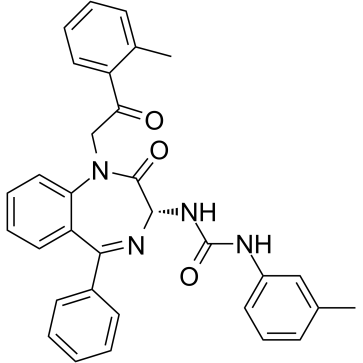YM022

YM022结构式

|
常用名 | YM022 | 英文名 | YM 022 |
|---|---|---|---|---|
| CAS号 | 145084-28-2 | 分子量 | 516.59000 | |
| 密度 | 1.23g/cm3 | 沸点 | 735.4ºC at 760mmHg | |
| 分子式 | C32H28N4O3 | 熔点 | 187-190 °C | |
| MSDS | 中文版 美版 | 闪点 | 398.6ºC | |
| 符号 |

GHS06 |
信号词 | Danger |
|
Motilin Stimulates Gastric Acid Secretion in Coordination with Ghrelin in Suncus murinus.
PLoS ONE 10 , e0131554, (2015) Motilin and ghrelin constitute a peptide family, and these hormones are important for the regulation of gastrointestinal motility. In this study, we examined the effect of motilin and ghrelin on gastric acid secretion in anesthetized suncus (house musk shrew,... |
|
|
Glycogen Synthase Kinase-3beta regulates Snail and beta-catenin during gastrin-induced migration of gastric cancer cells.
J. Mol. Signal. 5 , 9, (2010) The gastrointestinal peptide hormone gastrin is known to regulate various cellular processes including proliferation, migration and metastasis in gastrointestinal (GI) cells. The studies described here were undertaken to elucidate in detail the signaling path... |
|
|
Signaling through cholesterol esterification: a new pathway for the cholecystokinin 2 receptor involved in cell growth and invasion.
J. Lipid Res. 50(11) , 2203-11, (2009) Several studies indicate that cholesterol esterification is deregulated in cancers. The present study aimed to characterize the role of cholesterol esterification in proliferation and invasion of two tumor cells expressing an activated cholecystokinin 2 recep... |
|
|
Stimulatory effect of N-methyltyramine, a congener of beer, on pancreatic secretion in conscious rats.
Alcohol. Clin. Exp. Res. 34 Suppl 1 , S14-7, (2010) Alcoholic beverages stimulate gastric acid secretion and increase the appetite. Although ingested ethanol stimulates pancreatic secretion, alcoholic beverages contain several congeners. N-methyltyramine (NMT) was isolated from beer as a factor in stimulating ... |
|
|
Pharmacological and molecular characterization of muscular cholecystokinin receptors in the human lower oesophageal sphincter.
Neurogastroenterol. Motil. 12(6) , 539-46, (2000) In vitro cholecystokinin (CCK) contracts the human lower oesophageal sphincter by stimulating muscular receptors. The aim of this study was to characterize the muscular CCK receptor subtypes in the human lower oesophageal sphincter. Twenty-five circular strip... |
|
|
Physiological role of cholecystokinin B/gastrin receptor in leptin secretion.
Endocrinology 140(10) , 4406-10, (1999) In the present study, we investigated whether cholecystokinin (CCK) or its structurally related peptide gastrin participates in long term regulation of adipocyte leptin secretion. The levels of circulating leptin observed after 2 and 6 h of refeeding in 18-h ... |
|
|
Combination of sulindac and antimicrobial eradication of Helicobacter pylori prevents progression of gastric cancer in hypergastrinemic INS-GAS mice.
Cancer Res. 69(20) , 8166-74, (2009) Helicobacter pylori infection causes severe dysplasia manifested as gastrointestinal intraepithelial neoplasia (GIN) after 28 weeks post-H. pylori infection (WPI) in cancer-prone, hypergastrinemic male INS-GAS mice. We examined the efficacy of the nonsteroida... |
|
|
The effect and mechanism of action of capsaicin on gastric acid output.
J. Gastroenterol. 44(5) , 396-404, (2009) Capsaicin has beneficial pharmacological properties, such as the ability to improve appetite and digestion. However, capsaicin has been reported to suppress gastric acid output, but to increase secretion; no consensus as to its effects on gastric acid output ... |
|
|
Human bone marrow niche chemoprotection mediated by cytochrome P450 enzymes.
J. Biol. Chem. 280(39) , 33368-73, (2005) Substantial evidence now demonstrates that interactions between the tumor microenvironment and malignant cells are a critical component of clinical drug resistance. However, the mechanisms responsible for microenvironment-mediated chemoprotection remain uncle... |
|
|
Small synthetic ligands of the cholecystokinin-B/gastrin receptor can mimic the function of endogenous peptide hormones.
Yale J. Biol. Med. 71(3-4) , 337-46, (1998) The gastric cholecystokinin-B/gastrin receptor (CCK-BR) is a key regulator of enterochromaffin-like cell function and proliferation. Over the last decade, a number of small non-peptide CCK-BR "antagonists" have been discovered. Here, we demonstrate that some ... |